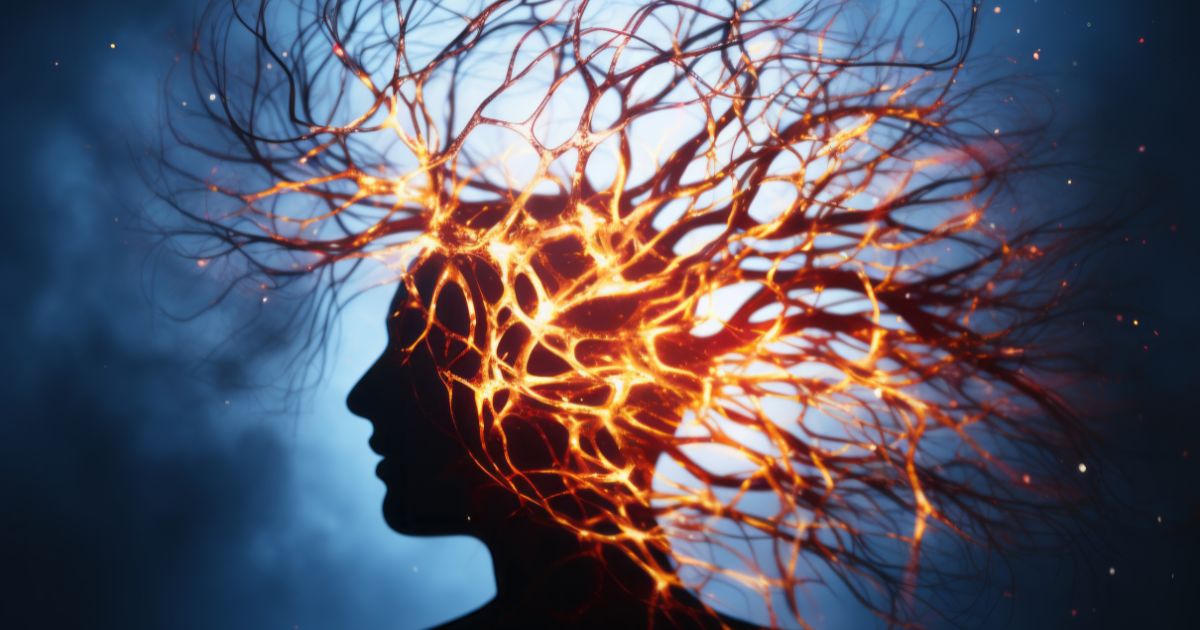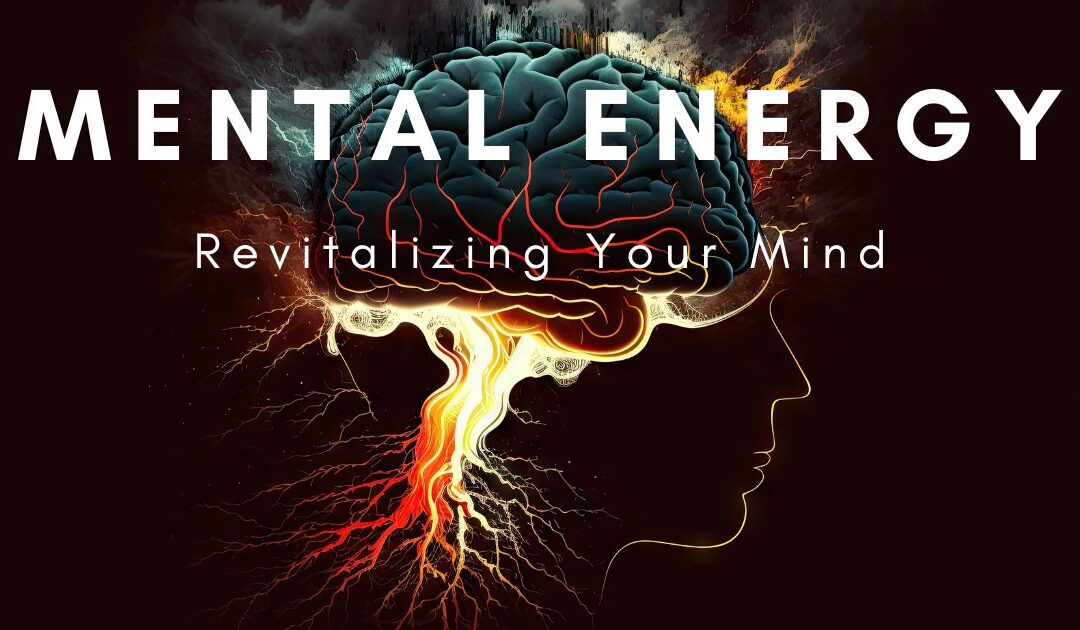Introduction To Mental Energy
Understanding The Concept Of Mental Energy
Mental energy is an essential element that affects both cognitive abilities (like attention span, memory, learning, and decision-making) and quality of life. Imagine it as fuel for your brain, propelling your focus, problem-solving skills, and general ability to get “stuff” done.1
The Importance Of Harnessing Your Mental Power
Harnessing your mental power isn’t just important—it’s critical to navigating the complexities of modern life. As recognized by Greek philosopher, Aristotle, “The energy of the mind is the essence of life.”
High mental energy levels empower us to make sound decisions, manage stress effectively, and bring clarity to our lives. When our mental energy is at its peak, it helps sharpen our focus and increase our productivity. It may also help promote a more positive outlook on life and even help strengthen our relationships.2
The Science Behind Mental Energy

Differentiating Mental Energy from Physical Energy
Differentiating mental energy from physical energy is important for understanding our overall energy levels. We tend to associate physical energy with stamina, strength, and the ability to perform physical tasks. However, mental energy is equally, if not more, essential.
Unlike physical energy that you can sometimes boost with a cup of coffee or an energy drink, mental energy usually requires a more comprehensive approach based on balanced nutrition, quality sleep and rest, regular exercise, and stress management.3
Think of it this way – the brain is the command center of your body, so it makes sense that it needs to be deeply nourished and cared for to generate mental energy. Otherwise, every task it performs is going to be a real struggle.
The Underlying Physiology Of Mental Energy
Mental energy is a complex process that relies heavily on the brain’s biochemical reactions. It requires the active participation of certain hormones and neurotransmitters, along with glucose and oxygen, to function optimally.4
Your brain only makes up about 2% of your body weight, but it consumes up to 20% of your body’s energy levels – and that’s just when it’s resting.5
This incredible energy consumption just to “run the machine” is partly because the brain contains an enormous number of neurons—approximately 86 billion—which constantly send and receive signals for bodily functions and brain activities.6
A Common Misconception About Mental Energy
Debunking The Myth Of Aging
One of the most common myths about mental energy is that it always declines with age.
That’s not necessarily true. In fact, studies have shown that though it’s normal for brainpower to decline with age, it’s not inevitable.7
Some people remain “mentally sharp” into their 80s, 90s, and beyond, proving that older adults can maintain, or even boost, their mental energy. Researchers continue to study the various reasons behind this.8
Detrimental Factors To Mental Energy
Impact Of Stress And Burnout On Mental Energy
Stress and overworking may significantly impair mental energy. Over time, this may lead to a state of “burnout,” characterized by physical, emotional, and mental exhaustion.9
When the body experiences long-term stress, cortisol, commonly known as the stress hormone, floods the brain and can disrupt its functions. This disruption can lead to foggy thinking, reduced concentration, poor recall, and emotional distress.10
Reducing Mental Fatigue: Digital Burnout
In today’s digital age, constant access to social media and the internet has evolved into a type of cognitive overload known as “social media fatigue.”11
From “doom-scrolling” – habitual scrolling through negative news stories and updates – to comparing our lives to others, social media has been shown to cause mental stress, feelings of anxiety, and emotional exhaustion. All of this can deplete mental energy.12

Strategies For Boosting Mental Energy
Role Of Diet In Enhancing Mental Energy
There’s a reason the old saying, “You are what you eat” is still relevant. Dietary choices directly influence our brains and our mental energy levels.
You see, the brain requires a constant supply of “fuel” from food, so what you eat directly affects its function. Consuming a diet rich in antioxidants, omega-3 fatty acids, vitamins, and minerals helps nourish the brain, supporting mental vitality.13
The brain leans heavily on glucose for energy, but a high-sugar diet can lead to excess glucose in the brain. This may have a negative effect on the brain, leading to recall issues and less mental energy. So, maintaining steady blood glucose levels through regular, balanced meals can help maintain consistent mental energy levels throughout the day.14
It can be challenging to get the nutrition we need from our food to function at our best. Supplementation may be helpful. Look for supplements that include ingredients like “super green” vegetables and antioxidants, or utilize calming herbs, like ashwagandha. If you’re in doubt about what supplements are best for you, talk to your doctor.
Physical Activity Goes Hand In Hand
The relationship between physical activity and mental energy can’t be overstated.
Exercise can help boost mental function. When you exercise, you increase blood flow to the brain. This, in turn, brings more oxygen to the brain, enhancing its performance.15
Recent studies suggest that exercise may help boost thinking, attention span, and perception. Movement may also enhance the ability to ignore distractions and multi-task.16
Whether it’s a brisk walk or a high-intensity interval training session, exercise may also contribute to heightened mental energy by promoting better sleep.17
The Need For Quality Rest And Sleep
Speaking of sleep, quality rest is central to restoring mental energy. Sleep is “neuroprotective” – meaning it helps protect the brain, allowing it to recharge so it can function normally. Think of sleep as a “hard reset” to reboot your phone or your computer.
Lack of sleep, or not enough sleep, can cause neurons in the brain to malfunction. This may affect behavior and performance, causing trouble concentrating, difficulty focusing, and recall issues.18
Beyond sleep, rest in all its forms is still important. Dr. Saundra Dalton-Smith has written extensively about this and believes that there are seven types of rest for the brain: physical (sleep), mental, sensory, emotional, social, creative, and spiritual (like meditation). All may help reset mental energy levels.19
Making an effort to set aside time for rest in your routine can be transformative for your mental energy.
Final Words: Living A Mentally Energized Life
Balancing Work and Rest for Optimum Mental Function
Striking a balance between work and rest helps promote optimum mental vitality. A work-life balance doesn’t just help to enhance mental energy, it’s also great for overall health, well-being, and productivity.
When it’s time for a mental break, remember, it’s not just about stepping away from work. You need to actually rejuvenate your mind. One way to do this is to visit a peaceful place, like a garden, park, or beach. Exposure to nature has been shown to significantly enhance mood and revitalize mental energy.20
Or, as Dr. Dalton-Smith advises, try to incorporate different types of rest into your routine. Pick and choose what feels best for you daily.

Staying Consistent in Energy Management Habits
Consistency is key when it comes to managing your mental energy. Developing and maintaining good habits, like regular exercise, a nutritious diet, quality sleep, and effective stress management, is crucial for boosting and preserving your precious mental energy.
Organizing your daily routine around your natural energy levels can also help maximize your productivity. If you tend to have more mental energy in the mornings, try to complete your most challenging tasks then.
The key to mastering any habit is to start small. Take a 10-minute walk each day, replace a sugary snack with a piece of fruit, or meditate for five minutes before bed—then, incrementally increase these over time.
Sources
- https://www.healthline.com/health/mental-health/mental-energy
- https://www.healthline.com/health/mental-health/mental-energy
- https://www.uhn.ca/PatientsFamilies/Health_Information/Health_Topics/Documents/Mental_Fatigue_and_What_You_Can_Do_About_It.pdf
- https://www.ncbi.nlm.nih.gov/pmc/articles/PMC5996770/
- https://www.ncbi.nlm.nih.gov/pmc/articles/PMC5996770/
- https://www.brainfacts.org/in-the-lab/meet-the-researcher/2018/how-many-neurons-are-in-the-brain-120418
- https://www.nia.nih.gov/news/cognitive-super-agers-defy-typical-age-related-decline-brainpower
- https://www.nia.nih.gov/news/cognitive-super-agers-defy-typical-age-related-decline-brainpower
- https://www.ncbi.nlm.nih.gov/pmc/articles/PMC9478693/
- https://www.ncbi.nlm.nih.gov/pmc/articles/PMC9478693/
- https://pubmed.ncbi.nlm.nih.gov/35114833/
- https://www.sciencedirect.com/science/article/abs/pii/S074756322200320X
- https://www.health.harvard.edu/blog/nutritional-psychiatry-your-brain-on-food-201511168626
- https://www.texasinstituteforneurologicaldisorders.com/uncategorized/effects-high-sugar-diet-brain/
- https://www.scientificamerican.com/article/why-do-you-think-better-after-walk-exercise/
- https://www.apa.org/topics/exercise-fitness/stress
- https://www.hopkinsmedicine.org/health/wellness-and-prevention/exercising-for-better-sleep
- https://www.ncbi.nlm.nih.gov/pmc/articles/PMC4651462/
- https://www.psychologytoday.com/us/blog/a-different-kind-of-therapy/202212/the-7-kinds-of-rest-you-need-to-actually-feel-rejuvenated
- https://www.apa.org/monitor/2020/04/nurtured-nature

